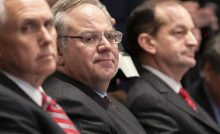Zimbabwe’s Mugabe remains president, at least temporarily, after ruling party fires him
Zimbabwean President Robert Mugabe, who was widely expected to resign Sunday after the ruling party sacked him and threatened to impeach him if he did not leave office, conceded a need for change but remained in the leadership post.
Mugabe, stripped of executive power when the military took control last week, said on state television late Sunday that he would preside over the party congress in December. He acknowledged that the country faced many challenges, including a struggling economy.
Flanked by members of the military, Mugabe stumbled several times while reading the speech. He was expected to announce his resignation but stopped short of doing so.
“The congress is due in a few weeks from now,” said Mugabe, 93, who has ruled Zimbabwe for 37 years. “I will preside over its processes.”
Mugabe lost the support of the military after he fired Emmerson Mnangagwa, a former vice president who has close links with the security services, and planned to install his wife, the deeply unpopular Grace Mugabe, so that she could succeed him. Members of the ruling ZANU-PF party and the military were outraged by the plan.
“Whatever the pros and cons of the way they went about registering those concerns, I as the president of Zimbabwe, as their commander in chief, do acknowledge the issues they have drawn my attention to, and do believe that these were raised in the spirit of honesty and out of deep and patriotic concern for the stability of our nation and for the welfare of our people,” Mugabe said Sunday.
Mugabe said he had met with Constantino Chiwenga, head of the armed services, and other military commanders and sought to return the country to normalcy. Mugabe said the military move had not breached Zimbabwe’s constitution or threatened him and had “remained respectful.”
“I’m happy that throughout the short period the pillars of state remained functional,” Mugabe said, referring to the current period of military control.
The ZANU-PF’s central committee had met earlier Sunday in Harare, the Zimbabwean capital, and voted to remove Mugabe as party leader and replace him with Mnangagwa.
The ruling party’s decision to install Mnangagwa places him in a position to succeed Mugabe and lead the ruling party into elections.
At ZANU-PF’s central committee meeting, former Finance Minister Patrick Chinamasa suggested the government would have no need to work with the opposition in a transitional government after Mugabe’s expected resignation.
Opposition leader Morgan Tsvangirai has called for Mugabe’s resignation and a government of national unity to be installed, including members of the opposition.
However, ZANU-PF appears intent in going into elections due next year with Mnangagwa as its leader, hoping to win elections and retain power.
Mugabe has been isolated and confined at his house since Wednesday, initially offering to resign before next year’s elections, a proposal rejected by the generals.
The military has denied its takeover of control is a coup, insisting Mugabe remains head of state and commander in chief of the armed forces. He cannot, however, exercise executive power or move around freely.
After Mugabe’s statement, Zimbabwean newspaper publisher Trevor Ncube said on Twitter that Mugabe presiding over the party congress was designed to offer him a dignified exit. An immediate Mugabe resignation would leave the nation with no leader until the party congress.
But many observers say Mugabe’s refusal to clearly spell out his resignation could see him impeached when parliament resumes Tuesday.
ZANU-PF has the two-thirds majority required to impeach, but only if all of its lawmakers support the motion. Some Mugabe loyalists are expected to stay away or vote against impeachment, in which case the government believes the opposition would support the impeachment motion.
Dancing broke out at ZANU-PF headquarters in Harare after the announcement was made that Mugabe had been dismissed as party leader.
The party expelled Grace Mugabe, accusing her of preaching hatred and division. Several of her close allies from a party faction known as G40, including Higher Education Minister Jonathan Moyo, Finance Minister Ignatious Chombo, Mugabe’s nephew Patrick Zhuwao and Local Government Minister Saviour Kasukuwere, were also expelled.
Mugabe’s removal as party leader came after tens of thousands of Zimbabweans, including opposition and government members, rallied to call for Mugabe to go.
Recent Posts
Review | Delayed checkouts at ‘The White Lotus’: An unoriginal third season
(Contains Spoilers) There is no meditation class, no reiki session, no nutritionally balanced, organic food…
Celebrating Women’s History Month with the HerStory Slam Event
Idaya Sasikumar, a first-year psychology student, took to the stage to read her personal story.…
Review | Michael Franti & Spearhead reflect on the power of love in new album ‘Welcome to the Family’
Nothing says “Welcome to the family!” like a new baby. Soul-rock band Michael Franti &…
How hurling put me on ESPN and in a National Championship game
Nothing is more difficult than joining a new club in college. It is terrifying when…
Column | It’s now or never for Henry Davis
When Henry Davis came into Monday night’s game against the Washington Nationals at PNC Park,…
Pitt men’s basketball navigating transfer portal difficulties
Pitt men’s basketball is like any other team in the world of large NIL deals…



